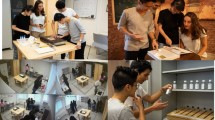Abstract
In the last years, knowledge transfer has played a more and more important role, especially between the academic field and society. But to offer a low-threshold access to scientific topics, new procedures have to be examined. Based on Game-Based Learning, Escape Rooms are a contemporary format of knowledge transfer, due to their possibility of easy and playful approaches towards different topics. To investigate if this format is accepted by the targeted group, a self-concepted and designed Escape Room was tested twice through observations, talks and an evaluation. The results show that this concept is perceived as an interesting and approved method for the intended purpose.
Access this chapter
Tax calculation will be finalised at checkout
Purchases are for personal use only
Similar content being viewed by others
References
Rauter, R.: Interorganisationaler Wissenstransfer. Zusammenarbeit zwischen Forschungseinrichtungen und KMU. Springer, Wiesbaden (2013). https://doi.org/10.1007/978-3-658-00927-4
Kanning, H., Meyer, C.: Verständnisse und Bedeutungen des Wissenstransfers für Forschung und Bildung im Kontext einer Großen Transformation. In: Abassiharofteh, M., et al. (eds.) Räumliche Transformation: Prozesse, Konzepte, Forschungsdesigns, pp. 9–28. Verlag der ARL-Akademie für Raumforschung und Landesplanung, Hannover (2019)
Weitze, M.-D, Heckl, W.M.: Wissenschaftskommunikation – Schlüsselideen, Akteure, Fallbeispiele, 1st edn. Springer Spektrum, Heidelberg (2016). https://doi.org/10.1007/978-3-662-47843-1
Abt, C.: Serious Games. University Press of America, Boston (1987)
Michael, D.R., Chen, S.L.: Serious Games – Games That Educate, Train, and Inform. Course Technology, Mason (2006)
Nicholson, S.: The state of the escape: escape room design and facilities. Paper Presented at Meaningful Play 2016. Lansing, Michigan (2016). http://scottnicholson.com/pubs/stateofescape.pdf. Accessed 03 Apr 2020
Corkill, E.: Real Escape Game brings its creator’s wonderment to life. The Japan Times Online (2009). https://www.japantimes.co.jp/life/2009/12/20/general/real-escape-game-brings-its-creators-wonderment-to-life/#.Xocyd0pCQ2x. Accessed 03 Apr 2020
Bakhsheshi, F.F.: Serious games and serious gaming in escape rooms. In: International Serious Games Symposium (ISGS), pp. 42–47 (2019)
Wilms, M.: Serious Games – Anwendung digitaler Spiele, insbesondere in den Bereichen Training, Bildung und HealthCare. GRIN, Munich (2009)
Le, S., Weber, P., Ebner, M.: Game-based learning. Spielend lernen? In: Ebner, M., Schön, S. (eds.) Lehrbuch für Lernen und Lehren mit Technologien, 2nd edn., pp. 219–228. epubli GmbH, Berlin (2013)
Glavaš, A., Staščik, A.: Enhancing positive attitude towards mathematics through introducing Escape Room Games. In: Kolar-Begovic, Z., Kolar-Super, R., Jukic Matic, L. (eds.) Mathematics Education as a Science and Profession, pp. 201–294. Faculty of Education, Department of Mathematics (2017)
Hermanns, M., et al.: Using an ‘Escape Room’ toolbox approach to enhance pharmacology education. J. Nurs. Educ. Pract. 8(4), 89–95 (2017)
Komm mach MINT: Das zählt zu MINT. https://www.komm-mach-mint.de/service/mint-datentool/das-zaehlt-zu-mint. Accessed 14 May 2020
acatech, Körberstiftung (eds.): MINT Nachwuchsbarometer. Gutenberg Beuys Feindruckerei, Hannover (2020)
Borrego, C., Fernández, C., Blanes, I., Robles, S.: Room escape at class: escape games activities to facilitate the motivation and learning in computer science. J. Technol. Sci. Educ. 7(2), 162–171 (2017)
Author information
Authors and Affiliations
Corresponding author
Editor information
Editors and Affiliations
Rights and permissions
Copyright information
© 2020 Springer Nature Switzerland AG
About this paper
Cite this paper
Thurner-Irmler, J., Menner, M. (2020). The Development and Testing of a Self-designed Escape Room as a Concept of Knowledge Transfer into Society. In: Ma, M., Fletcher, B., Göbel, S., Baalsrud Hauge, J., Marsh, T. (eds) Serious Games. JCSG 2020. Lecture Notes in Computer Science(), vol 12434. Springer, Cham. https://doi.org/10.1007/978-3-030-61814-8_9
Download citation
DOI: https://doi.org/10.1007/978-3-030-61814-8_9
Published:
Publisher Name: Springer, Cham
Print ISBN: 978-3-030-61813-1
Online ISBN: 978-3-030-61814-8
eBook Packages: Computer ScienceComputer Science (R0)




